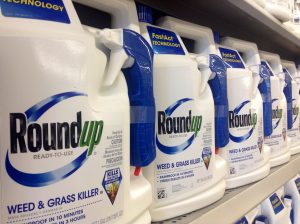06
Feb
Researchers Awarded for Uncovering Link between Glyphosate and Kidney Disease
 (Beyond Pesticides, February 6, 2019) The American Association for the Advancement of Science (AAAS) has awarded two researchers the group’s Scientific Freedom and Responsibility Award for their work uncovering the link between glyphosate and chronic kidney disease (CKD), which has killed at least 25,000 Sri Lankans and 20,000 Central Americans. Award recipients Sarath Guanatilake, MD, and Channa Jayasumana, PhD, faced death threats and claims of research misconduct as they went toe to toe with agrichemical industry giant Monsanto (now Bayer’s Monsanto), the major manufacturer of glyphosate-based products like Roundup.
(Beyond Pesticides, February 6, 2019) The American Association for the Advancement of Science (AAAS) has awarded two researchers the group’s Scientific Freedom and Responsibility Award for their work uncovering the link between glyphosate and chronic kidney disease (CKD), which has killed at least 25,000 Sri Lankans and 20,000 Central Americans. Award recipients Sarath Guanatilake, MD, and Channa Jayasumana, PhD, faced death threats and claims of research misconduct as they went toe to toe with agrichemical industry giant Monsanto (now Bayer’s Monsanto), the major manufacturer of glyphosate-based products like Roundup.
“To right a wrong when significant financial interests are at stake and the power imbalance between industry and individual is at play takes the unique combination of scientific rigor, professional persistence and acceptance of personal risk demonstrated by the two scientists recognized by this year’s award,” says Jessica Wyndham, director of the Scientific Responsibility, Human Rights and Law Program at AAAS.
In the mid-90s, reports began to emerge of Sri Lankan rice farmers – many otherwise healthy, young adults, succumbing to CKD. Dr. Gunatilake, a researcher at California State University, Long Beach (CSULB), was hired by the Sri Lanka Ministry of Health to investigate the cause of the disease. Around the same time, Dr. Jayasumana was working on his doctoral degree, and was able to link up with Dr. Gunatilake’s efforts, and join CSULB. Dr. Jayasumana provided Dr. Gunatilake with rice, drinking water, and urine samples that were subsequently analyzed in the lab. Results found that drinking water was contaminated with glyphosate and heavy metals, and that these compounds were making their way to workers kidneys.
Evidence shows that glyphosate bonds with heavy metals like arsenic and cadmium, forming stable compounds in water that do not break down until reaching the kidneys. CKD is a disease that develops relatively slowly, impairing the kidney’s ability to filter excess waste and fluid from the blood. Outcomes are generally poor with CKD, ultimately resulting in the need for dialysis, kidney transplant, or death. The results were published in a major scientific report in the International Journal of Environmental Research and Public Health.
The study brought international attention to the CKD, with many other developing countries in Central America, North Africa, and Southeast Asia noting similar epidemics. The Drs. were subject to intense scrutiny and pressure for their research. In typical pesticide industry malfeasance, twelve industry-funded scientists filed research misconduct complaints against Dr. Gunatilake, who was unsurprisingly exonerated. More concerning, both scientists received death threats for simply reporting their discoveries. This link shows the type of response Bayer’s Monsanto has posted to their website concerning the Drs.’ research.
A testament to the power of perseverance, the scientists work led a temporary important ban on glyphosate and lasting restrictions on its use in Sri Lanka. And Dr. Gunatilake has now raised more than $20,000 to help the families of victims.
“What started as a bold effort to provide a voice for the impoverished, powerless rice paddy farmers in Sri Lanka has now blossomed into a worldwide environmental movement through research, advocacy, networking and collaboration,” wrote public health professional Hanan Obeidi in the award nomination letter.
As the Drs.’ research shows, glyphosate’s link to cancer is only the tip of the iceberg when it comes to the range of chronic impacts resulting from exposure to the herbicide. Read more about the range of damage caused by this chemical in Beyond Pesticides fact sheets. Work to support a system that does not lead to rampant poisoning of farmworkers here and abroad by toxic synthetic pesticides by purchasing organic whenever possible.
All unattributed positions and opinions in this piece are those of Beyond Pesticides.
Source: EurekAlert- AAAS Press Release











Thanks for the Information.
July 18th, 2019 at 2:21 am